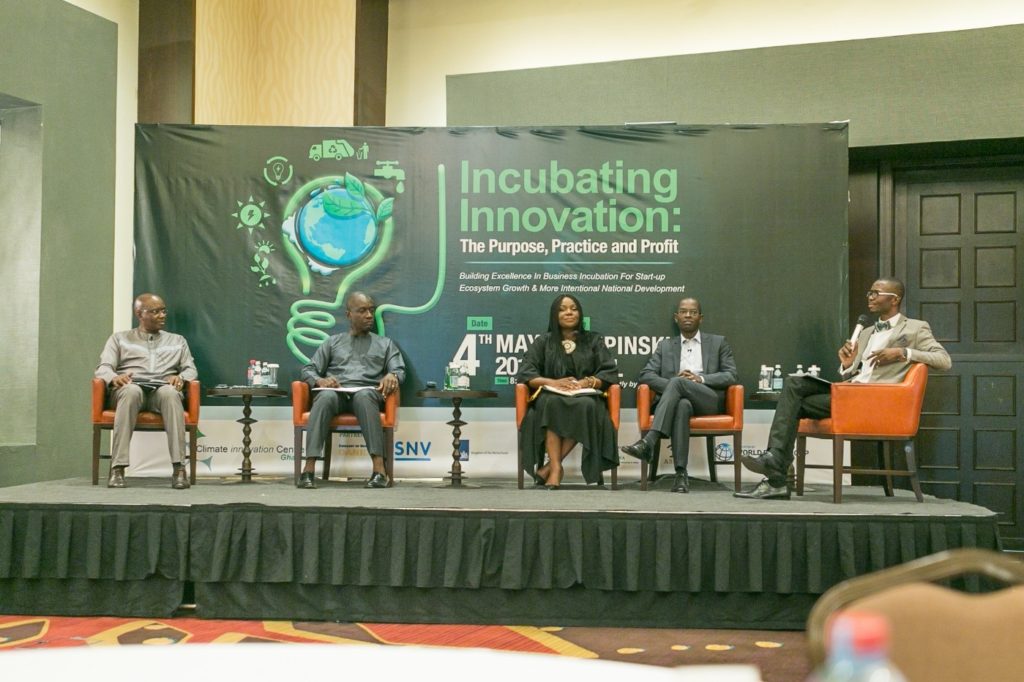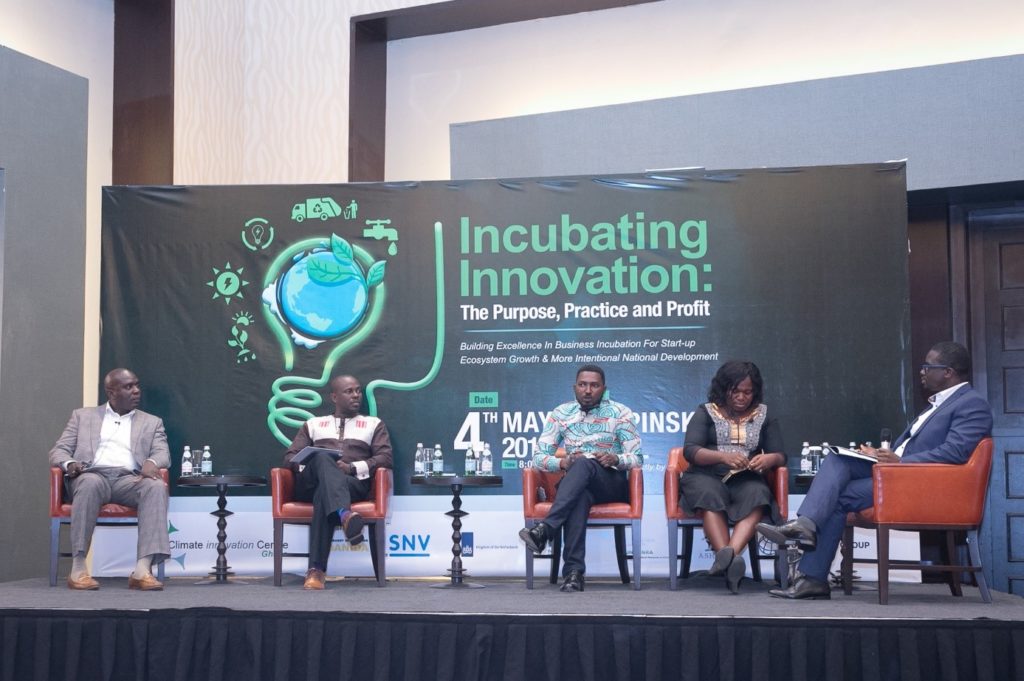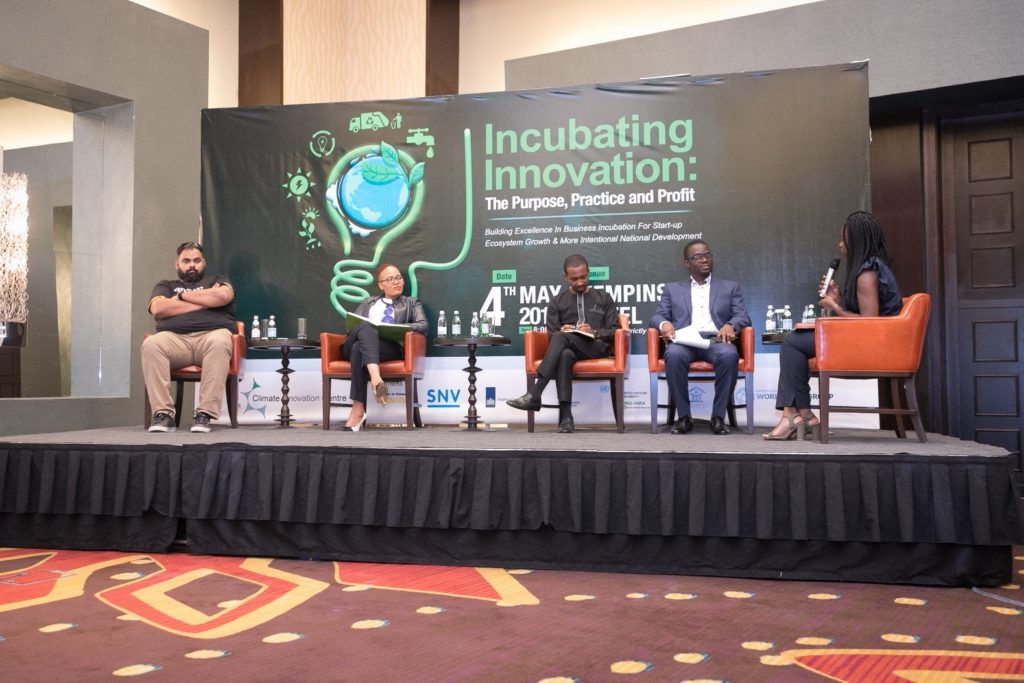On the 4th of May, in Accra, at the Kempinski Hotel, the Ghana Climate Innovation Centre (GCIC) held its flagship thought leadership annual event, Incubating Innovation. . The event, convened as a symposium, sought to examine and analyse the measures that can be taken to ensure that business innovation within the start-up ecosystem in Ghana is purposefully stimulated, nurtured and realised.
Recognising that the past four to five years has seen a proliferation in the emergence of business hatchery organisations offering a range of services to fledgling entrepreneurs and start-ups, the symposium brought together start-up thought leaders, incubator managers, investors and entrepreneurs to discuss how to build excellence in business incubation management for start-up incubation growth and more intentional national development.

The thought leadership symposium commenced with a Spoken Word performance on ‘Innovation’ by Chief Momeen, after which the audience heard two key note address from Oren Simanian, founder of StarTau, Tel-Aviv University Entrepreneurship Centre in Isreal, and Ms Seapei Mafoyane, CEO of Black Umbrellas, South Africa. Both keynotes spoke to “The Purpose of Incubation” drawing lessons from their respective countries, Israel and South Africa.
Israel is renowned for its success in building start-up ecosystem. The nation has the highest number of start-ups outside of Silicon Valley and receives the most VC investment per capita. With a population of only 8 million, Israel has over 6,000 start-ups, and 1,000 new start-ups are launched every year. In 2016 alone, Israeli start-ups raised over $4.8 billion. A global innovation hub, Israel boasts 277 global R&D innovation centres.
As an innovator in the Israeli start-up ecosystem and a mentor of early stage start-ups, Oren Simanian has helped thousands of Israeli entrepreneurs establish their businesses.. A key-thought leader in developing Israeli start-up ecosystem, Oren works with entrepreneurs, creators, and community builders across Israel to bring their ideas to the world. He is a mentor of early stage startups, and an inspiring guest speaker about innovation. As a key-person in developing Israeli start-up ecosystem, Oren Simanian is called an “Entrepreneur for Entrepreneurs”.
Oren spoke impassionedly about his work in building the Isreali start-up ecosystem. He inspired and motivated as he shared how deliberate and intentional economic, educational and financial infrastructure has shaped his start-up ecosystem.
Seapei Mafoyane’s address highlighted the importance of having a structured mechanism to drive and fuel successful innovation and entrepreneurship not in the small and growing business sector, but in the case of South Africa, the black business sector. “Research shows that 80% of small businesses in South Africa fail within the first two years. If you exclude white South Africans from the figures, then there is a 90% failure rate among the black community.” The imperative therefore is to reshape South Africa’s economic environment
Shanduka Black Umbrellas is South Africa’s premier business incubator and accelerator for black owned businesses, partnering with the private sector, government and civil society to support black-owned businesses in the critical first years of their existence, with a special additional focus on enterprise and supplier development (ESD). ESD is an international best practice philosophy which drives economic growth through the inclusion of SMES in supply chaings of large enterprises. ESD positively impacts the triple bottom line and fosters sustainable businesses. To date, Black Umbrellas has incubated 1408 SMEs, created and preserved 11,522 jobs, turned over ZAR2.6bn, paid ZAR584m in salaries, and tax paid by SMEs have totaled ZAR133m.


The key note address was followed by a series of panel discussion moderated by Bernard Alve (Citi Breakfast Show), Abdul-Nasser Alidu (GCIC) and Charlotte Ntim (World Bank).
Panel Session 1: Purposeful Incubation – Lessons from Africa
Panelists:
- Mr Henry Kerali, World Bank Country Director for Ghana, Liberia and Sierra Leone
- Djabanor Narh, Partner, Advisory Services, Ernst and Young Ghana
- Ruka Sanusi, Executive Director, Ghana Climate Innovation Centre
- Patrick Awuah, President, Ashesi University
 Panel Session 2: The Profit of Incubation – Successfully Exiting an Incubator: The Lows, The Highs, The Expectation
Panel Session 2: The Profit of Incubation – Successfully Exiting an Incubator: The Lows, The Highs, The Expectation
Panelists:
- Eric Nyanteh, CEO, Translight Solar Ltd
- Charles Hansen-Quao, co-Founder, DreamOval
- Gerard Badaweh Yitamkey, CEO and co-Founder, Ahomya.com
- Ivy Appiah, -CEO, Tiwajo Industries Limited

Panel Session 3: The Practice of Incubation – The Privilege and The Responsibility
Panelist:
- Abdul-Nasser Alidu, Entrepreneurship Director, GCIC
- Ebenezer Arthur, CEO, Wangara Capital
- Dr Rethabile Melamu, General Manager, Green Economy, Climate Innovation Centre, South Africa
- Ashwin Ravichandran, Head of Operations and Partnerships, MEST

Key take out from the panelist during their session include:
“….incubators play a critical role, together with business , accelerators and tech hubs to support small and growing businesses” – Henry Kerali
“…….You need to know people who know people…..that is how you can survive as an entrepreneur. What governance structures do you have in place?? We always suggest to entrepreneurs that have their own personal board of directors” – Djabanor Narh
“its really about the mindset change, that we have to move from to dependency to responsibility and we [incubators] are facilitators in the eco-system to help you to get to where you want …” – Ruka Sanusi
“ the idea [of incubation] is to give an entrepreneurial mindset” – Patrick Awuah
The Ghana Climate Innovation Centre (GCIC) is a pioneering business incubator whose objective is to support entrepreneurs and ventures involved in developing profitable and locally appropriate solutions to climate change mitigation and adaptation in Ghana. The Centre’s key focus is on building businesses operating within the areas of energy efficiency, domestic waste management, solar energy, water supply management and purification and climate-smart agriculture. GCIC is part of the World Bank Group’s infoDev Climate Technology Program. Supported by the governments of Denmark and the Netherlands, the Centre is managed by a consortium led by the Ashesi University and including Ernst & Young, SNV Ghana, and the United Nations University Institute for Natural Resources in Africa.


